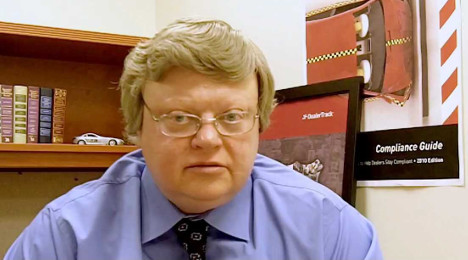AutoStar Solutions chief legal officer Steve Levine pointed out most dealers and finance companies are well aware of what he described as “big-picture” compliance safeguards they should implement into their collections efforts. But Levine also stressed that actually putting these policies and procedures into practice is another story.
With that scenario as a backdrop, Levine outlined three pieces of “big-picture advice” he has often heard in collections circles, along with details for making these objectives a reality.
“Compliance goals — whether they are for collections or another area of the business — often sound simple,” Levine said.
“Where dealers and lenders falter is getting caught up in operational needs and ultimately dropping the ball on legal obligations," continued Levine, who also will be a keynote speaker at Innovate 2015: The Independent Dealer Industry Conference, which is scheduled for September in Fort Worth, Texas.
“If you want to stay out of the crosshairs of attorneys and regulators, collections compliance is not just an option. There are certain imperatives you absolutely must follow. But it can be simple, I promise,” Levine went on to say.
— Vague advice: Develop a policy and procedure manual just for collections.
— What it means in real life: This document must set forth both operational expectations and the overall legal emphasis that each employee is responsible to know and follow the law.
“Don’t make it too complicated. The manual should be short, sweet and to the point. A smaller document is easier for employees to understand and follow,” Levine said.
“Plus, in the event of litigation, it won't be so cumbersome as to trip up employees,” he added.
Levine called the policy and procedure manual a company’s “Get Out of Jail Cheaper, If Not Free” card in the event of a legal challenge.
“You will be able to demonstrate that your stated company goal was to strictly follow the law, and that any deviation from that objective was an unintentional mistake,” Levine said.
“Thus, the problem can be limited to the failings of one employee rather than indicate a widespread company issue,” he continued.
—Vague Advice: Train your employees.
— What it means in real life: This might be the most troublesome spot for dealers and finance companies.
“In my experience, this is the area where companies most often fall short,” Levine said.
“You can have the best policy and procedure manual in the world, but it won't do you one bit of good if it's sitting in someone's desk and has never been rolled out to the collections floor,” he continued.
Levine recommended implementing a written training calendar to serve as a record of when every collector receives training.
“A collector should go no more than a few months without some form of training and reinforcement,” he said.
Since a lot of training happens one-on-one on the collections floor, Levine mentioned collections managers and supervisors must follow up and make a note in the collector’s file to show training was received. If possible, the collector should initial or sign the page, as well.
“If it isn’t written down, it didn't happen,” Levine said. “The plaintiff’s lawyers will always make that argument.”
Levine added that one of his larger clients built training into a monthly performance review meeting, which prioritized the issue in the minds of employees.
In another case, a small car lot with only a few collectors called attention to training by hosting a monthly brown bag lunch in which a pertinent training topic was presented.
— Vague advice: Regularly audit collection letters.
— What it means in real life: Levine explained this audit process must encompass all communications used to collect debt, including text and email. He pointed out the audit should uncover any “document creep,” or cases where more than one letter is used to accomplish the same thing.
“Not only is this wasteful and inefficient, but it creates risk if the letter content is incorrect,” Levine said.
Just like the training calendar idea, Levine suggested that companies should track every written communication, when it was last reviewed, and by whom. He recommended that managers also assess whether the letters take into account and complement call strategy and billing practices.
Levine also noted that an attorney or compliance professional should review any Article 9 letters, which concern repossession and its aftermath.
“There is nothing worse than losing twice, first when the customer doesn't pay and then again when you must pay that customer damages due to a statutory violation,” Levine said. “Proactive, regular reviews will avoid adding insult to injury.”
To get more in-depth, real-world knowledge on collections compliance, dealerships and finance company managers can join Levine and other legal experts at Innovate: The Independent Dealer Industry Conference, which runs from Sept. 20 through Sept. 23 in Fort Worth, Texas.
The event will feature more than 80 different classes — all 1½ hours long — that dive deep into compliance, collections, finance, accounting, operations and more.
“Innovate is the only show for independent dealers and lenders with two full compliance tracks, which by themselves cover 16 to 20 different topics,” AutoStar Solutions said. “In total, attendees will access more than $10,000 in legal insight for the price of admission.”
AutoStar expects more than 600 attendees at this year's conference, including major exhibitors and financial institutions that will showcase the latest dealership technology, best practices and industry solutions.
To view the full schedule or buy tickets, visit www.myinnovate2015.com.
While the Consumer Financial Protection Bureau doesn’t have direct jurisdiction over how dealerships operate, a new survey conducted by eLEND Solutions showed 80 percent of dealers expect bureau regulations will be implemented in the near future, further impacting their businesses.
What’s even more telling, the survey also indicated that less than half of dealers have plans in place to meet these new regulations, which might replace dealer participation with mark-up thresholds or a flat-fee model.
Dealers also told eLEND Solutions that they are ready to deliver a sales and financing process that begins online. The vast majority of respondents — 95 percent — agree that the industry should strive to create one, easy streamlined buying experience by starting both the sales and financing process online.
In fact, eight in 10 dealers agree that a connected online and in-store experience will help sell more vehicles faster and lead to greater customer satisfaction. And nearly 70 percent of dealerships say this is a goal for their store.
“This survey underscores that the time has come for a better sales and financing process, whether or not the CFPB has its way,” eLEND Solutions chief executive officer Pete MacInnis said. “The days of the four-hour, very disconnected, sales/financing process is poised to end as dealerships look to move more and more of the sales and financing process online — and connect it end-to-end.”
The main survey highlights included:
— Eighty percent of dealers think it’s highly (35 percent) or somewhat (45 percent) likely that CFPB regulations will be implemented; yet nearly 60 percent don’t have a plan in place to meet these regulations.
— Thirty-four percent think the impact of CFPB regulations will be positive, while another 31 percent think impact will be minor or none at all.
— Seventy-one percent strongly agree that “creating one easy, streamlined buying experience — by starting sales and finance together online — is a worthwhile goal.”
— Seventy-six percent of dealers stated that “connecting the online and offline shopping experiences to create one seamless, unified buying process could lead to accelerated sales, faster retail transaction times and greater customer satisfaction.”
— Sixty-nine percent of dealers say that connecting the online and offline shopping experiences is a goal at their dealership
— A full one-third of dealers say they are reluctant to put F&I online because traditional dealership processes insist financing be arranged exclusively in store.
The survey was conducted online among U.S. dealerships in March and April.
“Establishing a connected buying experience that starts sales and finance together online is an approach that helps dealers modify current negotiation/finance purchase contract processes that are likely to be required as a result of the probable CFPB changes to dealer participation policies,” eLEND Solutions said.
In a previous eLEND Solutions survey, 80 percent of dealers said that their sales and finance process averaged two hours or more and 40 percent reported that theirs lasted three hours or more. Meanwhile a whopping 82 percent of dealers say the ideal end-to-end process should take two hours or less.
Yet, according to a recent Autotrader survey, buyer satisfaction starts to decline after 90 minutes at the dealership. The same study showed that 66 percent of consumers would be much more likely to buy from a dealership that offers their preferred experience.
On Monday, Pelican Auto Finance engaged with product compliance and marketing firm FNI Inc. to provide management services and training for its recently announced vehicle service contract program with AUL.
Pelican turned to FNI to design a standardized product marketing process for its sales force and dealer base, which currently extends into more than 30 states. Product, policy and pricing transparency are cornerstones of FNI’s design, and together with a superior product, leads to results for consumers and dealers.
“Pelican’s easy to understand marketing process is designed for dealerships to simply provide every customer with complete, accurate product information and options, including terms, conditions and cost,” FNI president David Bafumo said.
“When it comes to product selection, Pelican’s first priority — offering customers the highest levels of used car mechanical breakdown protection with seamless claims service — made AUL a perfect fit,” Bafumo continued.
Pelican’s selection process included a site visit to AUL’s headquarters in Napa, Calif., and a thorough consumer focused review of the vehicle service contract terms, claim administration policies, and point of sale marketing materials with FNI.
“It was clear from our visit that the long experience of AUL’s management team and remarkable employment longevity of key customer service and claims personnel, means a superior experience for Pelican customers and dealers,” Pelican chief executive officer Troy Cavallaro said.
Documenting dealerships’ understanding of the marketing process at the time of training and customers’ product choices at the time of sale provides added peace of mind for Pelican’s executive team.
“We’ve integrated the AUL service contract program into our lending platform so that customers have the option of affordable protection from the catastrophic financial impact of mechanical breakdowns,” Pelican chief operating officer and chief compliance officer Joel Kennedy said.
“Knowing that every qualifying customer has had the opportunity to opt for the product, and has made an informed choice about it, is critical to the success of the program,” Kennedy went on to say.
Hudson Cook added a former high-ranking executive from Chase Auto Finance to be its newest partner.
Coming on board for its Long Island, N.Y., office is Trisha Cacciola, who has more than 25 years of experience in consumer and commercial auto finance law. Hudson Cook indicated Cacciola will support the firm’s auto finance and compliance practices, and her experience will further enhance the firm’s ability to provide meaningful and practical advice to its clients.
“Trisha brings skills and knowledge that will fit perfectly in the firm’s practice,” Hudson Cook chairman Tom Hudson.
From 1998 until earlier this year, Cacciola a served as assistant general counsel and executive director of Chase Auto Finance. Her responsibilities at Chase Auto Finance included regulatory exam management, manufacturer partnerships, fair lending, originations, servicing, collections, defensive litigation, floor plan, marketing, e-commerce, software/vendor contract drafting/negotiation and lobbying.
From 1993 to 1998, Cacciola served in the legal department of Bank of America’s predecessor financial institutions, Barnett Bank and NationsBank supporting consumer and commercial auto finance programs.
Prior to Cacciola’s in-house experience, she was an associate for five years with the law firm of Winston & Strawn in its New York office, practicing in the corporate, commercial loan, project finance and bank regulatory departments.
The National Independent Automobile Dealers Association and Dealertrack Technologies recently joined forces to give dealers an opportunity to get their F&I department questions answered without paying a retainer or being charged billable hours.
Dealertrack associate general counsel Randy Henrick worked with NIADA to create an online outlet for dealers to submit questions about adverse action notices, Red Flags, the Consumer Financial Protection Bureau as well as the Federal Trade Commission or any other matters related to F&I compliance
“Have an F&I compliance question or need an update on new rules and regulations which may impact your dealership? You're not alone,” officials said.
“Randy will get back to you personally with a reply at no charge to you or your dealership,” they continued. “There's no catch, no fine print. We simply want to share our industry expertise with the dealer community.”
Dealers can submit their questions at this website.
Digital Recognition Network announced this week that the company’s vehicle location data and license plate recognition technology services completed and passed a SOC 2 (Service Organization Control) Type 1 report for security, availability and confidentiality.
DRN officials highlighted that independent service auditor, Kirkpatrick Price, conducted the exam of the company’s vehicle location data and license plate recognition technology services controls as a service provider. The controls are measured against criteria for security, availability and confidentiality established by the American Institute of CPAs (AICPA).
DRN’s SOC 2 report for the company’s vehicle location data and license plate recognition technology services examined:
• Infrastructure: The physical and hardware components of DRN’s systems (facilities, equipment and networks)
• Software: DRN’s programs and operating software
• People: The personnel involved in the operation and use of DRN’s services (developers, operators, users and managers)
• Procedures: the automated and manual procedures involved in the operation of the system
• Data: The information used and supported by DRN’s services (transaction streams, files, databases and tables)
DRN chief executive officer Chris Metaxas emphasized the SOC 2 Type 1 Report assessment demonstrates DRN’s ability to deliver secure, trusted solutions to customers.
“Completing the SOC 2 Report assures our customers that we have the controls in place for security, availability, processing integrity, confidentiality and privacy,” Metaxas said.
“We understand that to our customers, these controls are absolutely essential given the regulatory nature of their businesses,” he continued. “DRN’s SOC 2 completion is yet another way that we help our clients with their compliance requirements.”
A pair of legal experts with decades of compliance experience shared a strategy that might help finance companies clear the latest hurdle placed in front of them by the Consumer Financial Protection Bureau — complaints being pushed out online for all the public to see.
The CFPB finalized its policy last month on why the regulator chose to allow these complaints to be made available, a move Michael Thurman said “sounds unfair to me.”
Thurman spent more than 20 years of his nearly three-decade career at firms including Keesal, Young & Logan as well as Loeb & Loeb before opening his own firm about a year ago. Thurman explained to SubPrime Auto Finance News that what the CFPB is orchestrating now is something unlike almost anything he’s seen previously.
“We were all taught there are two sides to every story. But in this case, the company doesn’t get a chance to tell its side,” Thurman said. “Instead, the company must choose from ‘a set list of structured company response options’ created by the CFPB.
“If the options are as vague as those used on the CFPB complaint database for describing consumer complaint, they won’t be very helpful,” he continued. “I seriously doubt a company will be able to select the option: ‘This complaint is a complete fabrication.’
“More importantly,” Thurman went on to say, “the CFPB admits that it ‘is not committing to verify the details contained in each complaint narrative.’ So what’s the value of a set of unverified complaints? If a group of Facebook or Twitter followers elects to barrage an auto finance company with a bunch of unverified complaints, how does that add any information to the public’s or the regulator’s knowledge about the company?
“For a data-driven, information-based 21st century regulator, it appears this new consumer complaint process will operate more like a rumor mill,” he added.
Also sharing her thoughts about the ramifications of the CFPB complaint database protocol was Jonna Boyle, president of Iron Compliance, a consulting firm in Arlington, Texas. Boyle previously served in compliance posts at SFG Finance, Santander Consumer USA and Triad Financial and is a board member of the National Automotive Finance Association.
“The impact of this policy may be largely determined by if and how the industry responds to the complaint narratives that are published on the CFPB's website,” Boyle said. “If the industry remains silent and chooses not to provide any of the structured responses, the impact could be minimal.”
Boyle then touched on whether finance companies should designate a staff member to watch the CFPB complaint database or even add more compliance personnel.
“Providing responses could open the door to an increase in complaint volume, but not enough to require additional staff in the short term,” Boyle said. “The smart strategy would be to respond to complaints as required, but opt out of the public response.
“It’s better if finance companies avoid drawing attention to themselves in such a pro-consumer forum,” she continued. “However, if a company chooses to stand their ground and publicly disagree with a consumer, they should also be ready to publicly declare when a consumer is right. Responding selectively will not go unnoticed. It’s all or nothing.”
Boyle added that she would advise finance companies not to make their CFPB complaint database responses public.
“All public complaint forums such as the Better Business Bureau and online complaint boards are optional, and the CFPB has chosen to make this public response optional for now,” she said. “As long as the finance companies are responding to the complaint as required, no other action is necessary.”
A former examiner with the Federal Reserve Bank of Atlanta now on staff at Equifax will host a compliance webinar aimed at helping finance companies and dealerships handle the impact of the Consumer Financial Protection Bureau.
Cris Larche, senior director of regulation and compliance at Equifax, will talk about the key regulations now enforced by the CFPB that most directly impact both finance companies and the F&I departments of dealerships.
In addition, Larche will discuss enforcement actions to illustrate key concerns and address other relevant issues that can impact auto lending, such as the risk retention guidelines.
Among the key topics to be addressed are:
— Larger Participant Rule
— Compliance Management System (CMS)
— Fair Lending
— Fair Credit Reporting Act
— Unfair, Deceptive, or Abusive Acts or Practices (UDAAP)
— Risk Retention (Qualified Automobile Loan)
The session is set for 2 p.m. ET on April 7.
Finance company and dealership personnel can complete registration for the webinar here.
The Federal Trade Commission referenced back to a practice this week that regularly upsets the agency, especially in the dealership arena when it comes to vehicle pricing and financing possibilities. It’s the concept of the bait and switch.
When asked about what concerns the FTC most about what unscrupulous dealers might be doing, Jessica Rich indicated what the regulator is most commonly seeing is what she called “bait-and-switch tactics where the advertisement says one thing, but it’s not the price that’s offered once you get to the dealer.
“It may be a special rate or discount but in the fine print are major qualifications that’s only available to people whose birthday is on a Tuesday — that’s a joke — but a very specific group of people,” said Rich, who is director of the FTC’s Bureau of Consumer Protection.
Rich, along with Joyce White Vance, United States Attorney for the Northern District of Alabama, spent nearly an hour on a teleconference after the FTC and 32 law enforcement partners announced the results of what they dubbed “Operation Ruse Control,” a nationwide and cross-border crackdown aimed at what they contend is to protect consumers when purchasing or leasing a vehicle.
Along with the bait-and-switch mention, Rich described the problems the FTC has with advertising disclaimers in fine print along with what she described as “deceptive” add-ons such as warranties that either aren’t fully explained or are integrated into the vehicle price, a practice known as payment packing.
“The deceptive ads with fine print disclaimers, or actually no disclaimers at all sometimes, are really unfortunately quite common,” Rich said. “That’s not to say there aren’t many, many honest dealers in this industry. But there are a lot of deceptive ads out there, and we’re going to keep bringing cases when we see them.”
And in regard to the problems with add-on products, Rich stated, “We have heard that this goes on a lot, and we will be looking for cases in this area. These two cases are the first but they won’t be the last.”
Furthermore, Rich mentioned how the FTC has found several examples of where advertisements or contracts are written in two different languages, resulting in difficulties for certain demographics such as Hispanics where their English proficiency might be limited.
“We at the FTC are very much on the lookout for scams that exploit people’s cultural differences or prey on particular groups. We have a number of initiatives in that area as well,” she said.
Could Finance Companies Be Victims, Too?
After Rich rattled off what dealer misdeeds are aggravating the FTC most nowadays, White Vance chimed in as well, delving into an area impacting finance companies.
First, White Vance acknowledged the parties involved in the settlements aren’t “indicative of what this industry is about because we’ve all had good experiences, and these stories about bad experiences come from consumers who were dealing with highly unethical salespeople. The practices I find to be most troubling are dealerships who inflate a buyer’s income so they can buy a car they can’t afford. Dealers should perhaps encourage strong purchasers who can qualify for loans to be the on-paper purchaser of the car rather than the one the purchaser cannot afford.
“This practice of adding non-existent vehicle accessories, saying you’ve got a moon roof and a high-end stereo on a vehicle that’s just the basic package in order to boost the loan amount,” Vance White continued. “These are practices that the dealers use to enhance their own bottom line without caring at all for the future financial stability of their customers and their family. If you want to talk about offensive, that’s it for me.”
In light of that assessment, White Vance recognized that finance companies could be victims in cases of fraud just like consumers, but “it’s often a fact-specific determination based on what happened in that particular case.”
She added, “Banks certainly need to be checking carefully, but in reality what we’ve seen is they don’t have the opportunity to check every single loan. Sometimes they do become victims.”
However, if finance companies have what White Vance described as “a cozy relationship with the dealer,” who might be producing questionable applications, the institution could end up being culpable of charges, too. But again the U.S. attorney from Alabama emphasized that any charges that might be levied are dependent upon the facts of the specific case.
Agency Collaboration
The FTC and the Consumer Financial Protection Bureau recently reauthorized their ongoing memorandum of understanding. The regulators explained the memorandum outlines the working relationship between the two agencies under the terms of the Consumer Financial Protection Act, and is designed to coordinate efforts to protect consumers and avoid duplication of federal law enforcement and regulatory efforts.
While this week’s enforcement actions didn’t include the CFPB, Rich insisted that federal regulators are collaborating with each other along with state and local authorities, resulting in enforcement actions like what the FTC shared this week.
“It’s a sign that this is a very important message we’re trying to get across both to businesses and to consumers that this type of deception will not be tolerated. It is illegal and there are ramifications. Enforcers at all levels are watching,” Rich said.
“We do find that working with our partners, people like Joyce in Alabama, and many others, does enable us to have greater impact,” she continued. “By working together we can bring more attention to the issue. Here we brought over 250 action across the country and even in Canada. We think it’s very good to work together. We have more of an impact. We’re trying to get a very strong message across.”
The Federal Trade Commission continues to ramp up its enforcement actions in the automotive space with its second significant collection of settlements in about 14 months.
On Thursday, the FTC and 32 law enforcement partners announced the results of what they dubbed “Operation Ruse Control,” a nationwide and cross-border crackdown aimed at what they contend is an effort to protect consumers when purchasing or leasing a vehicle.
The latest developments include 252 enforcement actions. The six new FTC cases also include more than $2.6 million in monetary judgments.
Officials indicated there were 187 enforcement actions in the United States since the agency’s last sweep along with 65 actions in Canada focused in Ontario and British Columbia. Enforcement efforts by the FTC, United States Attorney’s Office in the Northern District of Alabama and other partners at the federal, state and local level in the U.S. and Canada include both civil and criminal charges of deceptive advertising, automotive loan application fraud, odometer fraud, deceptive add-on fees, and deceptive marketing of car title loans.
“For most people, buying a car is one of the largest purchases they’ll make,” said Jessica Rich, director of the FTC’s Bureau of Consumer Protection.
“Car ads must be truthful, loan terms must be clear, and dealer practices must be honest. That’s why our partners are working together to crack down on deceptive marketing about car sales, leasing and financing,” Rich continued.
Joyce White Vance, United States Attorney for the Northern District of Alabama added, “Growing fraud and other deceptive practices in auto sales and financing are important issues affecting consumers when they are buying a vehicle.
“My office has worked closely with the FTC on this issue, and has prosecuted criminal cases at a Birmingham dealership,” White Vance went on to say. “The Mortgage, Loan Fraud and Discrimination Working Group of the Attorney General’s Financial Fraud Enforcement Task Force also is working with other law enforcement agencies to determine what we can do now to prevent fraud during the auto lending process.”
Cases Involving Vehicle Purchase Add-Ons
For the first time since receiving expanded authority over dealers under the Dodd-Frank Act, the FTC has taken two auto enforcement actions involving add-ons, which is the practice of a dealer or other third party adding to the vehicle sales, lease, or finance agreement charges for other products or services.
Officials indicated t few examples include extended warranties, payment programs, guaranteed automobile protection (commonly called GAP or GAP insurance), credit life insurance, road service, theft protection and undercoating.
Here are the details of two significant settlements the FTC announced:
—National Payment Network (NPN): The FTC charged that NPN, headquartered in San Mateo, Calif., allegedly violated the FTC Act by deceptively pitching consumers an auto payment program — both online and through a network of authorized dealers — that it claimed would save consumers money. The agency said NPN failed to disclose that the significant fees it charged for the service often cancelled out any actual savings. The fees to enroll in NPN’s program averaged $775 on a standard five-year auto loan.
—Matt Blatt and Glassboro Imports: In a related case, the FTC alleged that Matt Blatt dealerships, with multiple locations in New Jersey, violated the FTC Act by failing to disclose or adequately disclose the fees associated with NPN’s add-on service and that many consumers would not save money overall due to the program’s significant fees. The agency indicated Matt Blatt dealerships received a commission for each of the more than 1,000 consumers they enrolled.
Officials said NPN and Matt Blatt dealerships have agreed to settle the FTC charges, and under proposed consent orders are prohibited from misrepresenting that a payment program will save consumers money, unless the amount of savings is greater than the total amount of fees and costs charged in connection with the program. They also are prohibited from misrepresenting that the payment programs or their associated fees will improve, repair or otherwise affect a consumer’s credit record.
NPN will refund more than $1.5 million to consumers, and waive another $949,000 in fees to current customers during the fee waiver period. Matt Blatt dealerships also will pay $184,000 to the FTC as part of the settlement.
The commission votes to issue the two administrative complaints and to accept the proposed consent orders were 5-0.
Cases Involving Deceptive Advertising
The FTC reported three dealers — Cory Fairbanks Mazda of Longwood, Fla., Jim Burke Nissan of Birmingham, Ala., and Ross Nissan of El Monte, Calif. — have agreed to settle charges that they ran deceptive ads that violated the FTC Act, and also violated the Truth in Lending Act (TILA) and/or Consumer Leasing Act (CLA).
According to the FTC complaints, ads touted sales, lease or financing options that seemed attractive but were cancelled out by fine-print disclaimers. In other instances, the disclaimers did not disclose relevant terms, such as required down payments.
Officials explained the proposed settlements in these actions prohibit the defendants from misrepresenting the purchase cost or any other material fact about the price, sale, financing or leasing of a vehicle. Jim Burke Nissan and Cory Fairbanks Mazda are also prohibited from representing that a discount, rebate, bonus, incentive or price is available unless it is available to all consumers or all qualifications and restrictions are clearly and conspicuously disclosed.
The FTC added the proposed orders also address the TILA and CLA violations by requiring the dealerships to clearly and conspicuously disclose terms required by these rules.
The commission votes to issue the three administrative complaints and accept the proposed consent orders were 5-0.
“The FTC thanks the Consumer Protection Division of the Florida Office of the Attorney General in the Cory Fairbanks Mazda matter and the Los Angeles County Department of Consumer and Business Affairs in the Ross Nissan matter for their collaborative efforts and support,” officials said. “The FTC also would like to thank the South Carolina Department of Consumer Affairs for their contributions to this initiative.”
Auto Loan Modification Case
At the FTC’s request, the U.S. District Court for the Southern District of Florida temporarily halted the practices of Regency Financial Services of Lake Worth, Fla., and its chief executive officer Ivan Levy, who allegedly charged consumers upfront fees to negotiate an auto loan modification on their behalf, but then often provided nothing in return.
The court also froze defendants’ assets, and last month entered a Stipulated Preliminary Injunction Order. The FTC’s lawsuit filed on Jan. 26 is ongoing, and the commission is seeking a permanent injunction to stop defendants’ deceptive practices and to return ill-gotten gains to consumers.
According to the FTC’s complaint, defendants violated the FTC Act and Telemarketing Sales Rule by misrepresenting that they would obtain auto loan modifications for consumers and provide full refunds if they failed to do so.
The commission vote authorizing staff to file the complaint was 5-0.
“The FTC thanks the Florida Office of Financial Regulation for their support in this case,” officials said.
This operation follows the FTC’s sweep against 10 dealers announced last January, and “is part of the agency’s ongoing effort to protect consumers purchasing and financing a new vehicle,” the FTC said.












